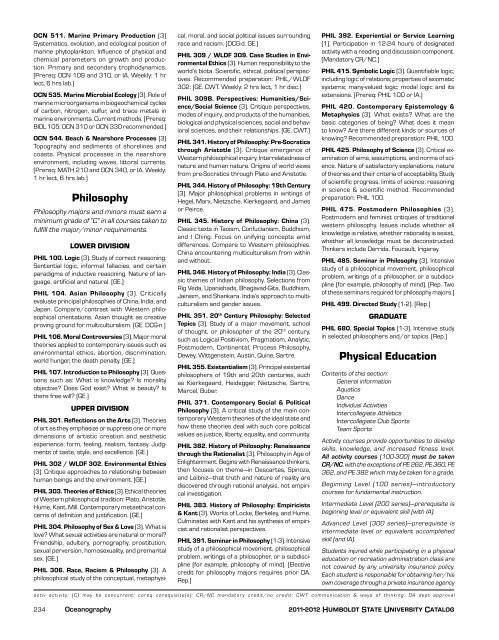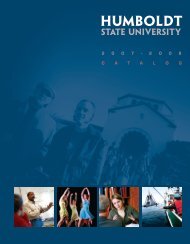2011-12 Academic Year - Bad Request - Humboldt State University
2011-12 Academic Year - Bad Request - Humboldt State University
2011-12 Academic Year - Bad Request - Humboldt State University
You also want an ePaper? Increase the reach of your titles
YUMPU automatically turns print PDFs into web optimized ePapers that Google loves.
OCN 511. Marine Primary Production (3)<br />
Systematics, evolution, and ecological position of<br />
marine phytoplankton. Influence of physical and<br />
chemical parameters on growth and production.<br />
Primary and secondary trophodynamics.<br />
[Prereq: OCN 109 and 310, or IA. Weekly: 1 hr<br />
lect, 6 hrs lab.]<br />
OCN 535. Marine Microbial Ecology (3). Role of<br />
marine microorganisms in biogeochemical cycles<br />
of carbon, nitrogen, sulfur, and trace metals in<br />
marine environments. Current methods. [Prereq:<br />
BIOL 105; OCN 310 or OCN 330 recommended.]<br />
OCN 544. Beach & Nearshore Processes (3)<br />
Topography and sediments of shorelines and<br />
coasts. Physical processes in the nearshore<br />
environment, including waves, littoral currents.<br />
[Prereq: MATH 210 and OCN 340, or IA. Weekly:<br />
1 hr lect, 6 hrs lab.]<br />
Philosophy<br />
Philosophy majors and minors must earn a<br />
minimum grade of “C” in all courses taken to<br />
fulfill the major/minor requirements.<br />
LOWER DIVISION<br />
PHIL 100. Logic (3). Study of correct reasoning.<br />
Sentential logic, informal fallacies, and certain<br />
paradigms of inductive reasoning. Nature of language,<br />
artificial and natural. [GE.]<br />
PHIL 104. Asian Philosophy (3). Critically<br />
evaluate principal philosophies of China, India, and<br />
Japan. Compare/contrast with Western philosophical<br />
orientations. Asian thought as creative<br />
proving ground for multiculturalism. [GE. DCG-n.]<br />
PHIL 106. Moral Controversies (3). Major moral<br />
theories applied to contemporary issues such as<br />
environmental ethics, abortion, discrimination,<br />
world hunger, the death penalty. [GE.]<br />
PHIL 107. Introduction to Philosophy (3). Questions<br />
such as: What is knowledge? Is morality<br />
objective? Does God exist? What is beauty? Is<br />
there free will? [GE.]<br />
UPPER DIVISION<br />
PHIL 301. Reflections on the Arts (3). Theories<br />
of art as they emphasize or suppress one or more<br />
dimensions of artistic creation and aesthetic<br />
ex perience: form, feeling, realism, fantasy. Judgments<br />
of taste, style, and excellence. [GE.]<br />
PHIL 302 / WLDF 302. Environmental Ethics<br />
(3). Critique approaches to relationship between<br />
human beings and the environment. [GE.]<br />
PHIL 303. Theories of Ethics (3). Ethical theo ries<br />
of Western philosophical tradition: Plato, Aris totle,<br />
Hume, Kant, Mill. Contemporary metaethical concerns<br />
of definition and justification. [GE.]<br />
PHIL 304. Philosophy of Sex & Love (3). What is<br />
love? What sexual activities are natural or moral?<br />
Friendship, adultery, pornography, pros titution,<br />
sexual perversion, homosexuality, and premarital<br />
sex. [GE.]<br />
PHIL 306. Race, Racism & Philosophy (3). A<br />
philosophical study of the conceptual, metaphysi-<br />
cal, moral, and social political issues surrounding<br />
race and racism. [DCG-d. GE.]<br />
PHIL 309 / WLDF 309. Case Studies in Environmental<br />
Ethics (3). Human responsibility to the<br />
world’s biota. Scientific, ethical, political perspectives.<br />
Recommended preparation: PHIL/WLDF<br />
302. [GE. CWT. Weekly: 2 hrs lect, 1 hr disc.]<br />
PHIL 309B. Perspectives: Humanities/Science/Social<br />
Science (3). Critique perspectives,<br />
modes of inquiry, and products of the humanities,<br />
biological and physical sciences, social and behavioral<br />
sciences, and their relationships. [GE. CWT.]<br />
PHIL 341. History of Philosophy: Pre-Socrat ics<br />
through Aristotle (3). Critique emergence of<br />
Western philosophical inquiry. Interrelatedness of<br />
nature and human nature. Origins of world views<br />
from pre-Socratics through Plato and Aristotle.<br />
PHIL 344. History of Philosophy: 19th Century<br />
(3). Major philosophical problems in writings of<br />
Hegel, Marx, Nietzsche, Kierkegaard, and James<br />
or Peirce.<br />
PHIL 345. History of Philosophy: China (3).<br />
Classic texts in Taoism, Confucianism, Buddhism,<br />
and I Ching. Focus on unifying concepts amid<br />
differences. Compare to Western philosophies.<br />
China encountering multiculturalism from within<br />
and without.<br />
PHIL 346. History of Philosophy: India (3). Classic<br />
themes of Indian philosophy. Selections from<br />
Rig Veda, Upanishads, Bhagavad-Gita, Buddhism,<br />
Jainism, and Shankara. India’s approach to multiculturalism<br />
and gender issues.<br />
PHIL 351. 20th Century Philosophy: Selected<br />
Topics (3). Study of a major movement, school<br />
of thought, or philosopher of the 20th century,<br />
such as Logical Positivism, Pragmatism, Analytic,<br />
Postmodern, Continental, Process Philosophy,<br />
Dewey, Wittgenstein, Austin, Quine, Sartre.<br />
PHIL 355. Existentialism (3). Principal existen tial<br />
philosophers of 19th and 20th centuries, such<br />
as Kierkegaard, Heidegger, Nietzsche, Sar tre,<br />
Marcel, Buber.<br />
PHIL 371. Contemporary Social & Political<br />
Philosophy (3). A critical study of the main contemporary<br />
Western theories of the ideal state and<br />
how these theories deal with such core political<br />
values as justice, liberty, equality, and community.<br />
PHIL 382. History of Philosophy: Renaissance<br />
through the Rationalist (3). Philosophy in Age of<br />
Enlightenment. Begins with Renaissance thinkers,<br />
then focuses on theme—in Descartes, Spinoza,<br />
and Leibniz—that truth and nature of reality are<br />
discovered through rational analysis, not empirical<br />
investigation.<br />
PHIL 383. History of Philosophy: Empiricists<br />
& Kant (3). Works of Locke, Berkeley, and Hume.<br />
Culminates with Kant and his synthesis of empiricist<br />
and rationalist perspectives.<br />
PHIL 391. Seminar in Philosophy (1-3). Intensive<br />
study of a philosophical movement, philosophical<br />
problem, writings of a philosopher, or a subdiscipline<br />
(for example, philosophy of mind). [Elective<br />
credit for philosophy majors requires prior DA.<br />
Rep.]<br />
PHIL 392. Experiential or Service Learning<br />
(1). Participation in <strong>12</strong>-24 hours of designated<br />
activity with a reading and discussion component.<br />
[Mandatory CR/NC.]<br />
PHIL 415. Symbolic Logic (3). Quantifiable logic,<br />
including logic of relations; properties of axiomatic<br />
systems; many-valued logic; modal logic and its<br />
extensions. [Prereq: PHIL 100 or IA.]<br />
PHIL 420. Contemporary Epistemology &<br />
Metaphysics (3). What exists? What are the<br />
basic categories of being? What does it mean<br />
to know? Are there different kinds or sources of<br />
knowing? Recommended preparation: PHIL 100.<br />
PHIL 425. Philosophy of Science (3). Critical examination<br />
of aims, assumptions, and norms of science.<br />
Nature of satisfactory explanations, nature<br />
of theories and their criteria of acceptability. Study<br />
of scientific progress, limits of science, reasoning<br />
in science & scientific method. Recommended<br />
preparation: PHIL 100.<br />
PHIL 475. Postmodern Philosophies (3).<br />
Postmodern and feminist critiques of traditional<br />
western philosophy. Issues include whether all<br />
knowledge is relative, whether rationality is sexist,<br />
whether all knowledge must be deconstructed.<br />
Thinkers include Derrida, Foucault, Irigaray.<br />
PHIL 485. Seminar in Philosophy (3). Intensive<br />
study of a philosophical movement, philosophical<br />
problem, writings of a philosopher, or a subdiscipline<br />
(for example, philosophy of mind). [Rep. Two<br />
of these seminars required for philosophy majors.]<br />
PHIL 499. Directed Study (1-2). [Rep.]<br />
GRADUATE<br />
PHIL 680. Special Topics (1-3). Intensive study<br />
in selected philosophers and/or topics. [Rep.]<br />
Physical Education<br />
Contents of this section:<br />
General information<br />
Aquatics<br />
Dance<br />
Individual Activities<br />
Intercollegiate Athletics<br />
Intercollegiate Club Sports<br />
Team Sports<br />
Activity courses provide opportunities to develop<br />
skills, knowledge, and increased fitness level.<br />
All activity courses (100-300) must be taken<br />
CR/NC, with the exceptions of PE 262, PE 360, PE<br />
362, and PE 382 which may be taken for a grade.<br />
Beginning Level (100 series)—introductory<br />
courses for fundamental instruction.<br />
Intermediate Level (200 series)—prerequisite is<br />
beginning level or equivalent skill (with IA).<br />
Advanced Level (300 series)—prerequisite is<br />
intermediate level or equivalent accomplished<br />
skill (and IA).<br />
Students injured while participating in a physical<br />
education or recreation administration class are<br />
not covered by any university insurance policy.<br />
Each student is responsible for obtaining her/his<br />
own coverage through a private insurance agency<br />
activ activity; (C) may be concurrent; coreq corequisite(s); CR/NC mandatory credit/no credit; CWT communication & ways of thinking; DA dept approval<br />
234 Oceanography<br />
<strong>2011</strong>-20<strong>12</strong> <strong>Humboldt</strong> <strong>State</strong> <strong>University</strong> Catalog

















